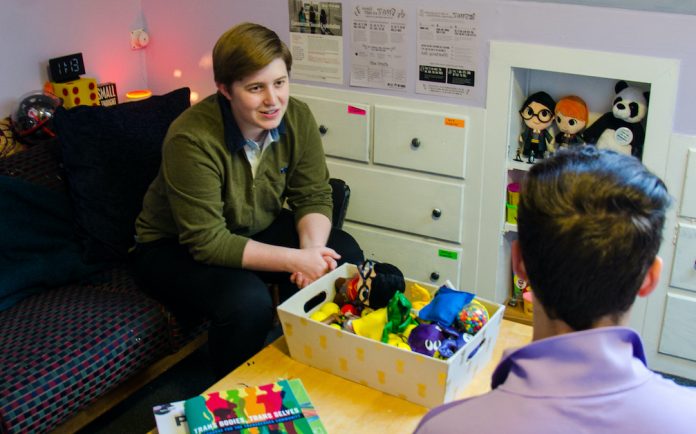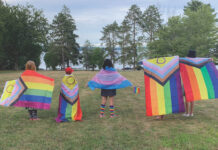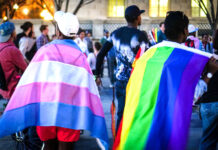The first in New England, and one of only three of its kind in the country, Waltham House is a residential group home designed specifically for youth who self-identify as part of the LGBTQIA community.
An offshoot of the 215-year-old Home for Little Wanderers, the agency began, according to Executive Director Allyson Montana, out of a growing awareness at the Home for Little Wanderers, that “they were seeing more and more queer kids, and that the generalized treatment they were offering wasn’t able to dive deeply enough into the special and more specific needs of LGBT people.”
Today, the program is staffed by “an incredibly diverse group of people,” says Montana. “Back at the beginning, it was all queer people—like some kind of P’town bubble—but over time, we have hired people who do not identify as LGBTQ. I believe the mix impacts our kids in a very positive way, in that they can see it is not just other queer people who understand.”
Many of the residents at Waltham House, ages 14–18, have experienced difficulties ranging from harassment and discrimination to acute trauma — at home or in placement — and all Waltham House staff are trained and prepared to intervene in these patterns, operating on a multi-disciplinary team approach. The staff can provide stabilization services, counseling and interventions, as well as opportunities to attend community-based activities such as gay-straight alliance activities, and engage in sports and community service projects. If indicated, Integrative Treatment for Complex Trauma (ITCT), Cognitive Behavioral Therapy (CBT) and Restorative practice are available to residents.
The program also helps to prepare residents for future plans, whether they are considering reunification with their families, transitioning to a foster family, or developing the essential skills to ensure success in independent living.
Out at Home
Launched a year ago, Out at Home uses Waltham House’s 20-plus years of expertise in therapeutic services to support youth and their families in an outpatient setting, allowing individuals to stay in their home environments and communities. Education for the entire family regarding LGBTQIA identities is provided, as are pathways to connect youth and families to community resources and supports. This is especially useful for those who may experience anxiety or discomfort when outside of the home.
Beyond that, as Montana explains, “It’s not always the LGBTQ person who needs the support,” with staff often providing services to siblings and other family members.
Volunteering
The staff are supported by a cadre of wonderful volunteers, some of whom come in and cook with the youth or just hang out, and some who become mentors to specific kids. One recent, and very special mentor/mentee match ended in the two becoming father and son. To become a mentor or volunteer, interested individuals can visit thehome.org, where volunteer opportunities, training sessions and contact information are listed.
The goal at Waltham House, says Montana, is to “create permanency in the lives of our youth, keeping and building on whatever the picture of family is for that individual, even if it is people not related to them.” Her staff, clearly a very dedicated group of talented and caring individuals, wants to see their residents get the support they need, in whatever way resonates with each of them; putting them on the path to a bright future.
Becoming Charlotte: A story of success
At 16, Chris could no longer keep it from his family that he really identified as a girl. Chris, now legally Charlotte, was greeted with every transgender child’s biggest fear: rejection. Her parents ordered her out of the house. Massachusetts’ Department of Children and Families (DCF) became involved, referring Charlotte to Waltham House.
She arrived very angry with the world. She knew there wasn’t a place for her in her family and was afraid there wasn’t a place for her in the world. So, surviving without a support system was her number one priority; her education was a very distant second. But Waltham House staff were determined to show Charlotte that she could succeed, and thrive.
As she became acclimated to life at Waltham House, Charlotte slowly built her confidence. She began attending high school, and, with help, she started the transition process. With the Commonwealth being Charlotte’s legal guardian, her quest for hormone therapy went to the court system, where, despite her parents’ last-ditch effort to have a conversion therapist give ‘expert’ testimony, the court ruled for Charlotte to start hormone therapy as well as her medical journey towards affirming her female identity.
Charlotte began to excel in school, and took the MCAS exam. She was able to get a job at a local bookstore, which brought out her work drive and managerial skills. Charlotte made friends with other residents, at school and in the community, finding through Waltham House, the support system every teen deserves.
Not a subscriber? Sign up today for a free subscription to Boston Spirit magazine, New England’s premier LGBT magazine. We will send you a copy of Boston Spirit 6 times per year and we never sell/rent our subscriber information. Click HERE to sign up!









